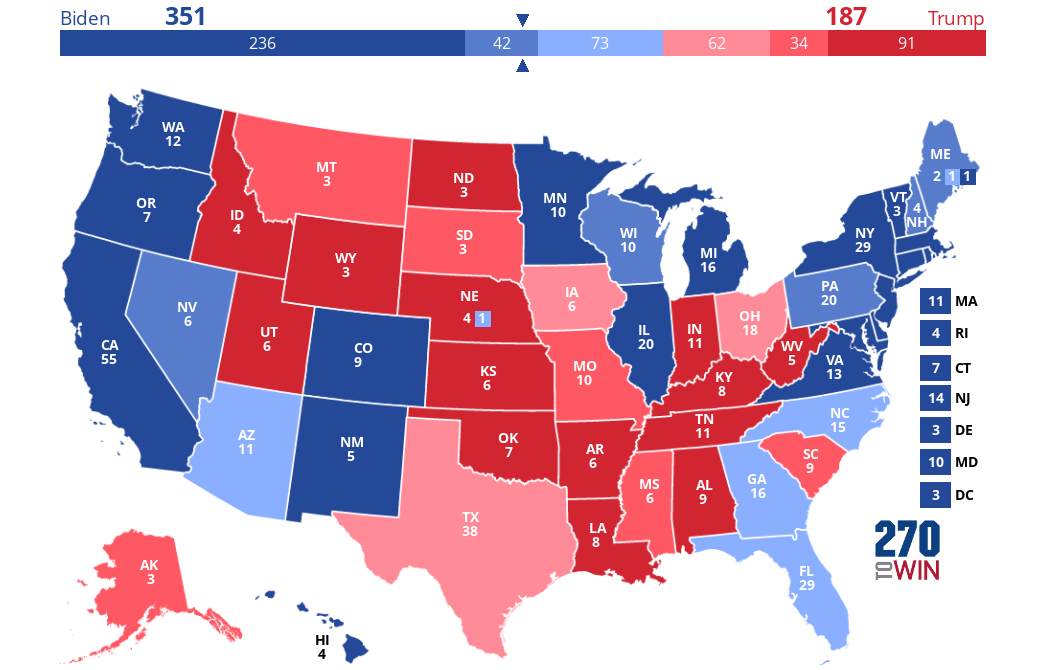The U.S. election is imminent. This post represents my final assessment.
Recently anti-Trump Republican Bill Kristol laid out three election scenarios as alternate Wednesday, November 4th headlines:
1. “Trump loses presidency as Midwest flips; GOP holds Senate.”
2. “Trump defeated by big margin; election called early as Florida and North Carolina go to Biden; Democrats win Senate.”
3. “Biden wins by double digits in popular vote; rout extends to victory in Texas; Democrats control Senate easily.”
My own gut reaction is that the most likely scenario is number two with the distinct possibility the scenario will be number three. The first scenario seems the least likely as a Democratic takeover of the Senate seems highly likely; indeed a big blue wave could happen. Trump can only win by coming from behind in the polls in a large number of states where he now trails. The only scenario for a Trump victory appears to be that he holds most of the states he won last time. Among the three midwestern states that he won for the Republicans for the first time in many years in 2016, he can afford to lose Wisconsin and Michigan where he trails significantly, but not Pennsylvania, where he is behind but by a smaller margin.
However, the poll averages reported on the websites Fivethirtyeight and Real Clear Politics, as well as the New York Times, suggest that, in addition to Wisconsin, Michigan and Pennsylvania, Trump is behind (sometimes narrowly) in the following jurisdictions he won in 2016: Florida, North Carolina, Arizona, Georgia, Nebraska 2nd Congressional District, and the Maine 2nd Congressional District. Overall, the polls would have to be more wrong than in 2016 for Trump to win. There is a narrow path where Trump overcomes his deficits in the southern states plus the one in Pennsylvania. On the other side of the ledger he holds only quite narrow leads in three states he won in 2016: Iowa, Ohio and Texas. He must win them all to have a chance.
Most analysts are skeptical of a 'shy' or 'hidden' Trump Voter effect. Here is political scientist Rachel Bitecofer;
"... I am skeptical of the “hidden Trump voter” thesis. Of course, one can find hidden Trump voters just as surely you can find secret Biden voters running around ruby red America. But as with “disaffected” Republicans defecting to vote for Biden, like the ones who have joined groups like Biden Republicans and who are donating money to The Lincoln Project, what we’re primarily concerned with is quantitative evidence of them at the mass level.
One way to test for hidden Trump voters is to compare Trump’s support between live interview polls and anonymous polls like those done by YouGov, which are anonymous and online - where no one can judge you. People have no need to hide from online or automated polls. But like in 2016, there is no difference in Trump’s level of support via these two data collection methods and often, Trump overperforms on live telephone interviews, which really undercuts the “hidden voter” hypothesis."
After the polling misses of 2016, primarily state polls as the national polls were close, pollsters examined what went wrong. Mainly, they concluded, they under-estimated non-college educated white voters, in part because they were either under-sampled or underweighted. They have made corrections to avoid that this time and are highly conscious of the earlier miss. However, perhaps they are now missing in the other direction, under-estimating the Biden vote.
After considering all the polling data plus my impressions this is the electoral map I expect (the grades of blue and red indicate how close the results should be):
You can see other scenarios at the 270 to win website including which states are considered toss-ups. The consensus forecast, which includes a number of states considered toss-ups, has Biden winning at least 290 electoral votes, enough to win the election.
On election night if Biden wins Florida, which counts early, the prospects of a Biden victory become so high that the fact that some states won't be finished their count the same night will likely not prevent the networks from making a call, particularly if another state such as Arizona or North Carolina goes for Biden. The advance and mail-in vote may be counted slowly in a number of states including the crucial three in the midwest. Several of recent elections have not been called before midnight on election day but this one may.




 Click the map to create your own at
Click the map to create your own at